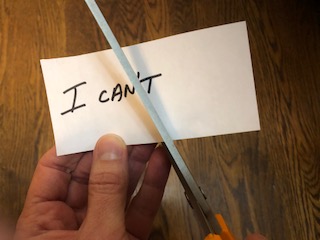One of my earliest introductions to the way in which beliefs influence outcomes was through Tony Robbins. I listened to his early audio programs on tape (!) in my Sony Walkman (!) on the subway each day, on a way to a job I hated. Within six months of finishing his program, I had quit my job and started up my own company, that I still run to this day. So it’s fair to say that I intimately understand the power that our beliefs exert on the life we choose to live.
One of the key concepts Tony raises–and that I’ve seen reflected in other programs I’ve participated in over the years–involves the identification of your limiting beliefs. The idea here is that we can’t possibly achieve our dreams if the negative voices in our head are getting in our way. To overcome that barrier, we need to identify our limiting beliefs and then create a replacement belief instead, so we don’t leave a vacuum in our head where the limiting belief can sneak back in.
What am I thinking?
Let me give you an example. Back in the day, one of my persistent limiting beliefs was: “I don’t have enough money to accomplish my goals.” I didn’t struggle that much to set big goals. I just didn’t really believe I’d ever achieve them. Sure, I could say I wanted to start up my own business, but how would I ever do that if I couldn’t quit my job? Where was the money supposed to come from while I was trying to build something new?
The challenge with limiting beliefs isn’t that they’re “wrong”. They’re just dis-empowering. I actually didn’t have the money to start my own business. That was true. But it wasn’t helpful. The belief was handcuffing me and forcing me to put a brake on my dreams before I even started towards them.
So I did the exercise. I came up with a new, empowering belief in the form of an affirmation that went like this: “My world is full of abundance. I have enough time, enough money, and enough energy to accomplish everything I want.”
Now, don’t get me wrong here. I still didn’t believe that. But I decided that, for the sake of the exercise, I’d go along for the ride. Every time my brain told me I didn’t have enough money, I recited my affirmation–in my head, out loud, whatever.
The power of repetition
I don’t know how long I did this for. Certainly several months. Probably several years, because old beliefs die hard. Either way, though, I discovered that by persistently, consistently repeating my affirmation, by brain started to think it was true. Not all at once and not all the time. But slowly, I realized that my world is full of abundance. I have enough time, enough money, and enough energy to do everything I want.
The magic of this process is that our brains really like it when we’re right. So if we keep imprinting this new belief on our brain over and over, our brain will actually start looking for evidence to prove that it’s true. Which means it will encourage us to take actions that support the new belief as well.
For me, that took the form of conducting information interviews with people who were running the kinds of businesses I wanted to start. I wanted to understand precisely how much money I could hope to make to make sure I wouldn’t go broke.
Oddly, during the course of that interview process, I met a mentor who offered me my first paying gig. The fee for this one project was equal to my monthly salary at the time, which gave me the confidence to quit my job.
That decision led to a spiral of new beliefs. Suddenly, I felt this amazing surge of confidence. I started believing that I had what it takes to succeed. And that belief fueled my business development efforts. Which landed me more jobs. Which resulted in business growth. Which led to even greater confidence. You get the drift.
Continuous improvement
One of the things I like most about replacing limiting beliefs with empowering ones is that it has no finish line. If you’re being honest with yourself, you’ll always uncover another layer of beliefs limiting you from achieving your next set of goals. Once you understand how to change those beliefs, however, they’re no longer monsters. They’re opportunities for constant improvement.
With a new year starting soon, it’s a really good time to take stock of what you’ve accomplished over this past year and set goals for what you want to accomplish next year. Which also makes it an ideal time to ask what limiting beliefs stopped us from achieving last year’s goals. If we nip them in the bud now, and create more empowering beliefs to replace them, I have no doubt next year will be better than last in every possible way.





Leave A Comment